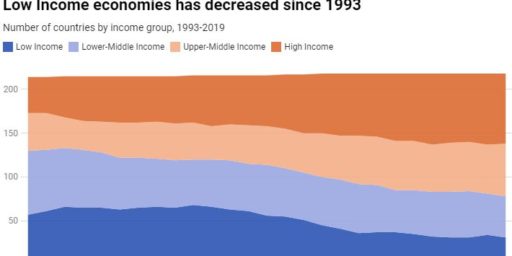Myth of American Economic Mobility
Clive Crook argues that it may be time to stop calling America the “land of opportunity.” Despite our sense that we live in a meritocracy, where hard work will pay off and sloth will be punished, “America stands lower in the ranking of income mobility than most of the countries whose data allow the comparison, scoring worse than Canada, all of the Scandinavian countries, and possibly even Germany and Britain (the data are imperfect, and different studies give slightly different results).”
Moreover,
The stickiness is at the top and the bottom. According to one much-cited study, for instance, more than 40 percent of American boys born into the poorest fifth of the population stay there; the figure for Britain is 30 percent, for Denmark just 25 percent. In America, more than in other advanced economies, poor children stay poor. Other data show that in America, more than in, say, Britain, rich children stay rich as well.
Crook cites inheritance, the growing coffers of elite universities, and local funding of primary and secondary schools as the prime culprits of said stickiness. Certainly, those things — especially the last — are important. His suggestion of an expanded Earned Income Tax Credit (a watered down version of Milton Friedman’s negative income tax) has merit.
Like many problems, though, this likely something that government intervention can shape only at the margins absent draconian measures.
Affluent parents are more likely to be good parents in a wide variety of ways. Certainly, they can ensure that their kids have adequate nutrition. They’re more likely to value education and ensure their children do their homework and have the necessary supplies. They are more likely to be able to help with said homework or to be able to afford tutoring assistance to keep their kids from falling behind. They’ll create an expectation in their children that they’ll go on to college and have meaningful careers rather than just jobs to make ends meet. They’re apt to have more time to spend with their kids and to have the wherewithal to have them participate in enriching after school and vacation activities.
At the upper end of the scale, they can send their kids off to prep school and afford the tuition at great universities. They’ll be more likely to know wealthy people in positions to mentor their college age children, get them internships, and a decent job when they get out of school. If that first job comes with an incredibly meager salary, they’re able to subsidize their young adult children while they pay their dues.
Very few of those advantages can be leveled by government interference that any but the Far Left would consider reasonable.






The *only* thing we can really do here, is to provide kids with first-rate schools.
So long as we leave schools up to a patchwork of districts and states, each with its own curriculum, teacher standards, etc., that will not be the case.
“Privatization,” as in so many other fields, is simply an invitation to the private sector to siphon taxpayer dollars into their wallets. Western Europe can educate kids in a public system; we could do, if we made it a priority to do so. We have not.
James; Diploma mongering aside; the best way for poor boys in our present culture to be upwardly mobile economically is through skill enhancement [learning a trade]. This approach involves “glass ceiling” type limitations of it’s own.
It is interesting that the stats quoted how poorly “boys” are doing in the U.S., since they are now being strongly discriminated against at the elementary grade level,thereby limiting their chances for a “higher education”,AKA a degree.
Anderson;
Remember the fact that “there is nothing you can do for a dollar that your federal government can’t do half as well for a thousand!”..FC
The problem with education is that in that lowest 5th you run into parents that do not value education. Many of them are also uneducated, and do not push for their children to become educated.
I work in an extremely poor school district, I can tell you that the poorest parents are the ones that are most likely to pass on parent teacher conferences, parent teacher nights or other school events, and they are also the ones whose children are most likely to not come to school with completed homework, they don’t read with their kids (although some of them may not read much better than their kids so this is a sort of catch 22) and they are the most likely to let their kids take at least one personal day off from school a week (and yes I meant personal day-when these kids come to school after a day off, they almost always say they stayed home because they didn’t want to come, not because they were sick).
Poor kids just aren’t all that future oriented.
There are poor families that do value education, and in general those kids are more successful and positive about school-whether or not those attitudes keep up I think will depend a lot on who their peers are as they get older.
We are worse than Canada? C’mon! That guys point must be bogus! How can we be worse than Canada at anything?
Remember the fact that “there is nothing you can do for a dollar that your federal government can’t do half as well for a thousand!”..FC
That is why Medicare, grossly inefficient as it is, spends more of each dollar on actual healthcare than private plans do.
There are a few really well-run businesses, but in general, the myth of private-sector superiority is just that.
I’m all for free markets in most things for various reasons (Hayek etc.), but there are areas where it’s hazardous to let the market set all the priorities — as should be clear to anyone not a free-market fundamentalist. There is more to being a good citzen than being a good consumer or producer.
Anderson: no matter; there are no potatoes!
There is more to being a good citizen than having your life controlled by bureaucrats too!
You seem to think that government can provide efficiently what they can’t even regulate to ethical standards.
“How can we be worse than Canada at anything?”
Oh, face reality, will ya! You’re worse than us at *everything*!
We have a jackpot economy, more and more simply being educated is no longer a guarantee of any kind of success. We are pumping out collage grads when good paying jobs are on the decline. I lived for three years in a collage town, I work at a university and more and more kids simply feel their undergrad degree is about as worthless as a HS diploma.
The only thing that will help the poor are more good paying jobs. It starting to look like the circumstances that produce a broad robust middle class in the 50’s and 60’s was a happy accident rather then anything we did to create it. Not only are those days gone, but unless we find and energy source cheaper then oil things will only get worse and a comfortable lifestyle will become something that is more and more out of reach.
Poor kids might work harder if they thought there was even a chance at a decent job at the other end of the tunnel, but alas, that is not the case.
more than 40 percent of American boys born into the poorest fifth of the population stay there; the figure for Britain is 30 percent, for Denmark just 25 percent….
Do we know if the statistics are skewed by both legal, illegal immigration and higher birth rate? Does the statistic take into account that up to 10% of the lower socioeconomic statra of Mexico (population 120M) may have taken up residence in the US in the past 15 years?
Are we confident as to how poverty statistics are measured in the US? In yesterday’s local paper, I read that 50% of students in the Burlington, VT school district qualify for the federally subsidized school lunch program. (Something tells me that this statistic is misleading.)